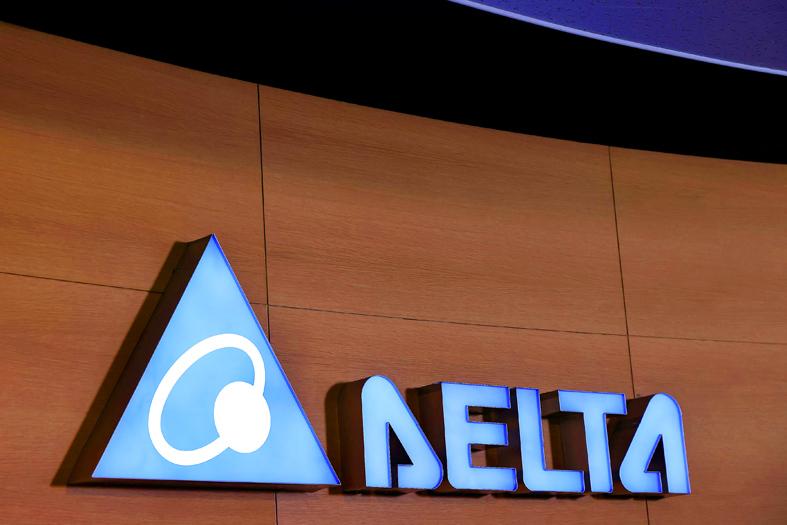Power and thermal management solutions provider Delta Electronics Inc (台達電) on Saturday said it would acquire US-based Universal Instruments Corp for US$88.9 million.
Taking over the precision automation solutions company would boost Delta’s smart manufacturing and industrial automation capabilities, and generate substantial research-and-development and customer base synergies, the Taipei-based firm said.
“Universal Instruments has a remarkable track record and long-lasting customer relationships in the electronics manufacturing field, which is a key focus of Delta’s industrial automation business,” Delta chief executive officer Cheng Ping (鄭平) said.

Photo: Ann Wang, Reuters
Headquartered in Conklin, New York, Universal designs and manufactures automation and assembly equipment solutions for electronics manufacturers. The company has customers in a wide range of sectors, including automotive, computing, medical, industrial and printed circuit board surface mount placement.
It holds more than 500 patents and has since its founding in 1919 delivered nearly 30,000 systems to customers, Delta said.
After the acquisition is completed, Universal would continue to operate under its original management team, Delta said, adding that the acquisition would be finalized when the conditions stated in the purchase agreement have been met.
“By adding Universal’s precision automation machine offerings and leading technologies to our highly diversified industrial automation portfolio, we can offer customers total solutions capable of enhancing the productivity” and reducing the carbon footprint of their production lines, Cheng said.
Delta’s automation segment contributed 14 percent to the company’s total revenue in the third quarter of this year, down 8 percent from the previous quarter, but up 16 percent from the third quarter of last year to NT$11.28 billion, the company reported on Oct. 29.
The power electronics and infrastructure segments are the biggest drivers of Delta’s business, contributing 60 percent and 26 percent respectively to its revenue, company data showed.
The deal with Universal comes after Delta in November last year completed the acquisition of Trihedra Engineering Ltd, a Canadian software company focusing on supervisory control and data acquisition, as well as industrial Internet of Things applications.
Delta invested C$45 million (US$34.9 million at the current exchange rate) in Trihedra to broaden its industrial automation and system integration portfolio, it said at the time.
Capital Investment Management Corp (群益投顧) said that Delta has over the past few years been looking for merger and acquisition opportunities worldwide, a strategy that would help it gain traction in the US and European markets.
Delta’s industrial automation business is likely to benefit from trends in the US and Europe in the long run, Capital said in a note.

MULTIFACETED: A task force has analyzed possible scenarios and created responses to assist domestic industries in dealing with US tariffs, the economics minister said The Executive Yuan is tomorrow to announce countermeasures to US President Donald Trump’s planned reciprocal tariffs, although the details of the plan would not be made public until Monday next week, Minister of Economic Affairs J.W. Kuo (郭智輝) said yesterday. The Cabinet established an economic and trade task force in November last year to deal with US trade and tariff related issues, Kuo told reporters outside the legislature in Taipei. The task force has been analyzing and evaluating all kinds of scenarios to identify suitable responses and determine how best to assist domestic industries in managing the effects of Trump’s tariffs, he

TIGHT-LIPPED: UMC said it had no merger plans at the moment, after Nikkei Asia reported that the firm and GlobalFoundries were considering restarting merger talks United Microelectronics Corp (UMC, 聯電), the world’s No. 4 contract chipmaker, yesterday launched a new US$5 billion 12-inch chip factory in Singapore as part of its latest effort to diversify its manufacturing footprint amid growing geopolitical risks. The new factory, adjacent to UMC’s existing Singapore fab in the Pasir Res Wafer Fab Park, is scheduled to enter volume production next year, utilizing mature 22-nanometer and 28-nanometer process technologies, UMC said in a statement. The company plans to invest US$5 billion during the first phase of the new fab, which would have an installed capacity of 30,000 12-inch wafers per month, it said. The

Taiwan’s official purchasing managers’ index (PMI) last month rose 0.2 percentage points to 54.2, in a second consecutive month of expansion, thanks to front-loading demand intended to avoid potential US tariff hikes, the Chung-Hua Institution for Economic Research (CIER, 中華經濟研究院) said yesterday. While short-term demand appeared robust, uncertainties rose due to US President Donald Trump’s unpredictable trade policy, CIER president Lien Hsien-ming (連賢明) told a news conference in Taipei. Taiwan’s economy this year would be characterized by high-level fluctuations and the volatility would be wilder than most expect, Lien said Demand for electronics, particularly semiconductors, continues to benefit from US technology giants’ effort

‘SWASTICAR’: Tesla CEO Elon Musk’s close association with Donald Trump has prompted opponents to brand him a ‘Nazi’ and resulted in a dramatic drop in sales Demonstrators descended on Tesla Inc dealerships across the US, and in Europe and Canada on Saturday to protest company chief Elon Musk, who has amassed extraordinary power as a top adviser to US President Donald Trump. Waving signs with messages such as “Musk is stealing our money” and “Reclaim our country,” the protests largely took place peacefully following fiery episodes of vandalism on Tesla vehicles, dealerships and other facilities in recent weeks that US officials have denounced as terrorism. Hundreds rallied on Saturday outside the Tesla dealership in Manhattan. Some blasted Musk, the world’s richest man, while others demanded the shuttering of his